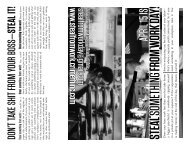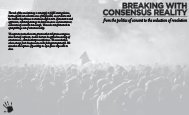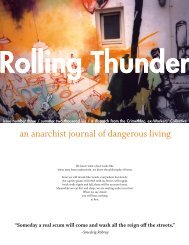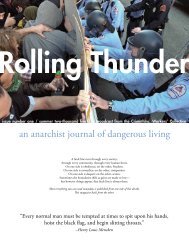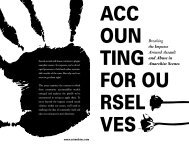HEiST! - CrimethInc
HEiST! - CrimethInc
HEiST! - CrimethInc
You also want an ePaper? Increase the reach of your titles
YUMPU automatically turns print PDFs into web optimized ePapers that Google loves.
We are line cooks and bartenders, waitresses<br />
and bakers. We sell produce at<br />
farmers’ markets; we operate cash registers,<br />
we stock shelves and make espresso<br />
drinks. We take commodities, rearrange<br />
them and move them around, adding value<br />
so that our employers may make a profit.<br />
We are workers in the service industry, in<br />
essence no different from those who work<br />
on construction sites or in the few remaining<br />
factories of our post-industrial cities.<br />
The Team<br />
Is Real<br />
on the<br />
TEAM<br />
Wear the button when you’re at work.<br />
Hook people up with discounts and freebies.<br />
Wear the button when you go out.<br />
Get Hooked Up. Remember to ask your<br />
teammates where they work.<br />
Build the team.<br />
Talk to your friends and trusted coworkers.<br />
The more people on the team, the better.<br />
useful for the community; but they can only<br />
make what they want to make on their own, or<br />
at most with a few others.<br />
So these two steps towards the senseless –<br />
producing useless things and renouncing payment<br />
– in fact turn out to be two steps in the<br />
direction of freedom, even though they are<br />
swiftly blocked by the wall of wage labor. In<br />
fact, homers are a vain attempt to defect from<br />
the cosmos of piece-ratios.<br />
Suppose that all of our work could be governed<br />
by the pleasures of homers, then it would<br />
follow that in every homer is the kernel of a<br />
completely different sense: that of work carried<br />
out for pleasure. The industrial psychologist,<br />
the expert in managerial methods, the social<br />
technician, and all the growing number of specialists<br />
who are replacing functionaries once<br />
breathless with the heroism of labor cannot<br />
comprehend the hopelessness of their task if<br />
they are unable to understand the pleasures of<br />
homers. Their task is to dry out the oases while<br />
filling the desert with mirages. Were it not that<br />
these experts in production are also dispensers<br />
of our livelihood, in command of discipline<br />
and achievement, we would enter the age of<br />
the Great Homer. This alienated sense, imposed<br />
from outside by wages (and its denial, the consolations<br />
of forbidden irrationality), would be<br />
replaced by the ecstasy of true needs. Precisely<br />
what is senseless about homers from the point<br />
of view of the factory announces the affirmation<br />
of work motivated by a single incentive,<br />
stronger than all others: the conviction that our<br />
labor, our life, and our consciousness can be<br />
governed by our own goals. The Great Homer<br />
would be realized through machines, but our<br />
experts would subordinate them to two requirements:<br />
that we use them to make things of real<br />
utility, and that we are independent of the machines<br />
themselves. This would mean the withering<br />
of production controls. We would only




